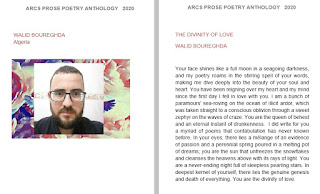ANWER GHANI; EXPRESSIVE NARRATIVE IN" THE SOLDIERS OF GOD" BY KAREEM ABDULLAH
Expressive
narrative poetry is a literary writer which seeks to achieve poetry in the
center of prose without inclination to one of them or tyranny in the text, just
as poetry manifests itself, prose is also manifested. Poetry manifests itself
in the expressive narration by lyric expressiveness and prose is manifested by
writing free from all splitting or formal music or other visual or formal art
where the coherent, continuous and logical construction of sentences and
paragraphs.
Expressive
narration is an attempt to answer a question about prose poetry and prose poem;
what is prose poem? How can a prose verify poetry? Is what is written from
prose poetry improved with visual music and what is the form that achieves the
integration of prose poetry?
Expressive
narration was an attempt to answer a question about poetry: What is poetry? We
see the poetry remaining in the translated poetry in which there is no visual
or formal music, so what is poetry and where does the poetry lie?
Expressive
narration was an attempt to answer a question about the text? What is the text,
is it the writing that is on the paper, or is it another presence in the level
of what is behind the writing and in the mind and among the reader and between
individuals?
Here,
in these lines, we will clearly see the expressive narration in the “Soldiers
of God” poem by the Iraqi poet Kareem Abdullah.
Karim
Abdullah's poems are generally distinguished by long expressions and complete
prose, with a continuous sentences structure without apparent fragmentation,
but fragmentation in depth. It tells but it does not tell an event, but rather tells
a feeling. With meaning that it does not tell a story, but rather tells poetry
and lyricism.
THE
SOLDIERS OF GOD by KAREEM ABDULLAH was translated from Arabic by me John Henry
Smith.
THE
SOLDIERS OF GOD
KAREEM
ABDULLAH
Heavily
armed with their frustration, Your soldiers drag the metropolis misery before
your authority that ends up in the blindest tyranny, violate their humanity and
you do not know anything about the banks of supplication lounged on by her
distant voice that comes to the ears of the sea, whenever the trees of alienation
smile, the extensive face of night falls, lying there, ahead the soldiers as
deconstructing my lavishing history on the tongues of the ominous war. They led
the leftover of dream crucified in your shining evening, searing it in front of
the mockery of stations, eulogized by the childbirth of a morning that sleeps
on the brink of a glow of the waiting of my return shackled with rifles as
tearing the whoop of the resurrection, tattooed on the wings of the colorful
butterflies behind the glass of the bombed cars.
This
ten-line poem is only three sentences. This is very strange in poetry. And that
the third sentence exceeds the length of the four lines.
1-
Heavily armed with their
frustration, your soldiers drag the metropolis misery before your authority
that ends up in the blindest tyranny, violate their humanity and you do not
know anything about the banks of supplication lounged on by her distant voice
that comes to the ears of the sea.
2-
Whenever the trees of alienation smile, the
extensive face of night falls, lying there, ahead the soldiers as
deconstructing my lavishing history on the tongues of the ominous war.
3-
They led the leftover of
dream crucified in your shining evening, searing it in front of the mockery of
stations, eulogized by the childbirth of a morning that sleeps on the brink of
a glow of the waiting of my return shackled with rifles as tearing the whoop of
the resurrection, tattooed on the wings of the colorful butterflies behind the
glass of the bombed cars.
These sentences are written in a simple and very
poetic prose, without fragmentation or free of logic, and in a striking scriptural
style, but from this prose the poetry emerges. How Kareem did it? It's the expressionism.
The title brought the reader to a world of
idealistic soldiers, but he is shocked by strong protest and words full of
blindness, bitterness, and destruction.
Through this shift in the mind of the reader
from the field of idealism to the field of criticism and tyranny, Kareem
Abdullah achieved an important expressionism. Then, after the reader realized
that Kareem Abdullah is talking about soldiers who are not from God, but they
are the soldiers of the blind dictator and the tyrant at that time, the mind
starts to arrange his duties, but the shock happened and went away in the
depth.
Now the reading begins to notice that it is
in front of a world of metaphor and symbolism, but amid the apparent structure
of the story and prose, it is the art of opposites, which creates
expressiveness from the story and poetry from prose. So, the prose poem comes
true.
Then the reader begins with realizing that
the words are not intended to be their characters and their souls, but rather their
symbolism, and that the events are not intended to be their time and place, but
rather the emotional strength and feelings they carry, and thus the lyricism in
constructive prose is achieved.
Subscribe to:
Comments (Atom)








